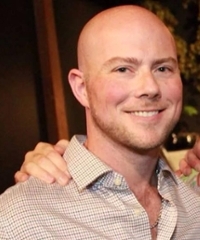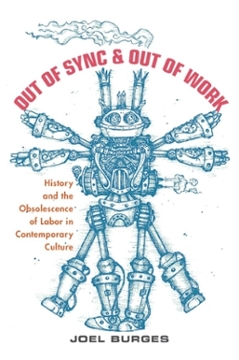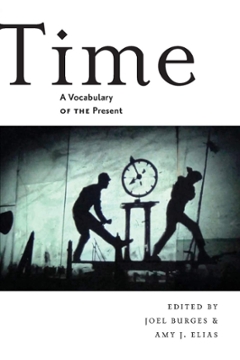
Joel Burges
Associate Professor of English
Associate Professor of Visual and Cultural Studies
PhD, Stanford University
- Office Location
- 413 Morey Hall
Research Overview
Joel Burges is Associate Professor of English and Visual and Cultural Studies. He is also faculty in Film and Media Studies and Digital Media Studies. Burges is the author of Out of Sync & Out of Work: History and the Obsolescence of Labor in Contemporary Culture (Rutgers UP, 2018) and co-editor, with Amy J. Elias, of Time: A Vocabulary of the Present (NYU Press, 2016). He is at work on two books. The first is Television and the Work of Writing, which explores writing for television as both economic labor and aesthetic craft—as work and form—from Rod Serling, Carl Reiner, William Greaves, and Tina Fey to Michaela Coel, Mindy Kaling, Veena Sud, and Matthew Weiner. The second is The Horror of Stagnation, which examines the horror named in the title as both an economic and cultural mode from slasher films to racial satires to the stripper movie. His writing has also appeared in, among other places, New German Critique, Post45, Digital Humanities Quarterly, and Cinema Journal. In 2022 Burges was the recipient of the Edward Peck Curtis Award for Excellence in Undergraduate Teaching and the Judith Kerman Faculty Award for Teaching and Mentoring in Culture and Technology.
Burges is also the principal investigator on Mediate, a platform for the digital annotation of audiovisual and time-based media with cross-disciplinary applications that has been used by Bowdoin College, the University of Pittsburgh, the University of Rochester, and Wake Forest University. His primary collaborators on Mediate are Emily Sherwood, Joshua Romphf, and Vini de Andrade Romualdo of the Department of Digital Scholarship in River Campus Libraries. Mediate is currently supported by a Mellon Foundation Public Knowledge Grant for the project “A Digital History of the Close-Up in Narrative Film and Television,” a collaboration with Kinolab and Allison Cooper at Bowdoin College, and an American Council of Learned Societies Digital Justice Seed Grant for the project “The Rochester Digital Annotation Project,” which partners with the Visual Studies Workshop and the Nomadic Archivists Project. Both the Mellon and ACLS projects explore the audiovisual histories of race, ethnicity, indigeneity, gender, and sexuality using digital annotation, close reading, and cultural analytics as central methods. Other digital work, especially in the area of videographic criticism, is currently supported by a Connection Grant from the Social Sciences and Humanities Research Council for the cross-institutional project “Embodying the Video Essay.”
Research Interests
- Media studies, cultural studies, and American studies
- 20th and 21st century film and television
- Critical and cultural theory
- Digital humanities, especially digital annotation, data visualization, and videographic criticism
- Labor and culture
- Audiovisual histories of race, class, gender, and sexuality
Selected Publication Covers

Associated publication of a definition of “the book” on the basis of Chapter 2 of Out of Sync & Out of Work as part of Amaranth Borsuk’s digital project “Essential Knowledge: The Book” (t-h-e-b-o-o-k.com), with all definitions published as a special issue in the American Book Review (Fall 2020) and as a printed chapbook, The Book: 101 Definitions (Anteism Books 2021), which collaboratively extends Borsuk’s study, The Book (MIT Press, 2018). More info...
Selected Publications
Books and Collections
- Television and the Work of Writing. Book in progress.
- Out of Sync & Out of Work: History and the Obsolescence of Labor in Contemporary Culture, Rutgers UP, 2018.
- Time: A Vocabulary of the Present. Edited with Amy J. Elias. New York University Press, 2016.
Articles and Essays
- “The Horror of Stagnation, or, the Perspectival Dread of It Follows,” in The Labors of Fear: Work in Horror Cinema, ed. Aviva Briefel and Jason Middleton, Austin: the University of Texas Press, 2023.
- “Audiovisualities out of Annotation: Three Case Studies in Teaching Digital Annotation with Mediate,” with Solveiga Armoskaite, Tiamat Fox, Darren Mueller, Joshua Romphf, Emily Sherwood, and Madeline Ullrich, DHQ: Digital Humanities Quarterly 15.1 (2021). http://www.digitalhumanities.org/dhq/vol/15/1/000507/000507.html
- “Temporality,” in A Concise Companion to Visual Culture, ed. A. Joan Saab, Aubrey Anable, and Catherine Zuromskis, Hoboken, NJ: Wiley-Blackwell, 2021.
- “Black Studies Now and the Countercurrents of Hazel Carby,” with Alisa V. Prince and Jeffrey Allen Tucker, InVisible Culture: An Electronic Journal for Visual Culture 31 (2020). https://ivc.lib.rochester.edu/black-studies-now-and-the-countercurrents-of-hazel-carby/
- “The Violence of Nostalgia, or, the Crisis of Middle Class Modernity on Stranger Things,” Post45: Contemporaries, July 2019. http://post45.org/2019/07/the-violence-of-nostalgia-or-the-crisis-of-middle-class-modernity/
- “Boys, Fractured: Stranger Things and Nostalgia Now,” with Jason Middleton, Post45: Contemporaries, July 2019. http://post45.org/2019/07/boys-fractured-stranger-things-and-nostalgia-now/
- “Collective Reading: Shot Analysis and Data Visualization in the Digital Humanities,” with Nora Dimmock and Joshua Romphf, Cinema Journal Teaching Dossier 3.3 (2016).
- “Obsolescence/Innovation,” in Time: A Vocabulary of the Present, ed. Joel Burges and Amy J. Elias, New York: New York University Press, 2016.
- “Time Studies Today,” with Amy J. Elias, introduction to Time: A Vocabulary of the Present, ed. Joel Burges and Amy J. Elias, New York: New York University Press, 2016.
- “‘We Are All Geeks Now’: Fantasy as a Mode of Social Practice in Disenchanted Modernity,” book review of Michael Saler, As If: Modern Enchantment and the Literary Prehistory of Virtual Reality, Twentieth Century Literature 59.3 (2013).
- “Adorno’s Mimeograph: The Uses of Obsolescence in Minima Moralia,” New German Critique 40.1 (2013). Reprinted in The Mimeograph, a Tool for Radical Art and Political Contestation, Bergen, Norway: Alt Går Bra, 2016.
- “Loving Miéville’s Sentences,” Post45, February 2012.
- “The Television and the Teapot: Obsolescence, All that Heaven Allows, and a Sense of Historical Time in Contemporary Life,” in Trash Culture: Objects and Obsolescence in Cultural Perspective, ed. Gillian Pye, New York: Peter Lang Publishing Group, 2010.
Special Issues
- “Stranger Things and Nostalgia Now,” co-edited with Jason Middleton, Post45: Contemporaries, July 2019, with essays from Aviva Briefel, David Bering-Porter, Joel Burges, Jason Middleton, Elizabeth Reich, and Amy Rust. http://post45.org/sections/contemporaries/stranger-things/
- “Black Studies Now and the Countercurrents of Hazel Carby,” co-edited with Alisa V. Prince and Jeffrey Allen Tucker, InVisible Culture: An Electronic Journal of Visual Culture 31 (2020), with essays from Hazel V. Carby, Joel Burges, Jeffrey Allen Tucker, Anne Anlin Cheng, Michelle Ann Stephens, Heather Vermeulen, Jerome Dent, Alisa V. Prince and Alanna Prince, Patrick Sullivan, Pablo Miguel Sierra Silva, Miranda Mims, Kathryn A. Mariner, Cilas Kemedjio, Matthew Omelsky, Brianna Theobald, Darren Mueller, and Will Bridges. http://ivc.lib.rochester.edu/table-of-contents-issue-31/
Interviews
- “Knowing Yourself, Historically: An Interview with Hazel Carby,” with Jerome Dent, Alisa V. Prince, Patrick Sullivan, and Jeffrey Allen Tucker, edited by Clara Auclair and Byron Fong, annotated by Kendall DeBoer and Peter Murphy, InVisible Culture: A Journal of Visual Culture 31 (2020).
Teaching
- Colloquium in Visual and Cultural Studies (graduate class)
- Close-Ups and the Scale of the Moving Image (graduate class)
- Comedy in Film and Television (undergraduate seminar)
- Critical Theory/Media Theory (graduate class)
- Marxism and Forms (graduate class)
- What Is Contemporary Cinema? (graduate class)
- The Trouble with TV (graduate class)
- Science Fiction & Fantasy (at Five Points Correctional Facility) (undergraduate seminar)
- Literature after TV (undergraduate seminar)
- The Politics of Television (undergraduate seminar)
- Clocks and Computers: Visualizing Cultural Time (undergraduate seminar)
- Back to the Future: Alternative Modernities from the Victorian Novel to the Culture of Steampunk (undergraduate seminar)
- Introduction to Media Studies (undergraduate lecture)
- Film History, 1989-Present (undergraduate lecture)
- The Poetics of Television (undergraduate lecture)
- Animation and the Arts (undergraduate lecture)
- The Art and Science of Time (team taught) (undergraduate lecture)
Honors
- Mellon Foundation Public Knowledge Grant, “A Digital History of the Close-Up in Narrative Film and Television,” with Kinolab and Allison Cooper, Cinema and Media Studies, Bowdoin College, 2023.
- Social Sciences and Humanities Research Council, Connection Grant, “Embodying the Video Essay,” with Allison Cooper (Bowdoin College), Lucy Donaldson (St. Andrews University), Colleen Laird (University of British Columbia), Dayna McLeod (McGill University, Concordia University), and Alison Peirse (University of Leeds), 2023.
- American Council of Learned Societies, Digital Justice Seed Grant, “The Rochester Digital Annotation Project,” with Emily Sherwood (Digital Scholarship, UR), Miranda Mims and Steven Fullwood (Nomadic Archivists Project), and Tara Nelson (Visual Studies Workshop), 2022-24.
- The Edward Peck Curtis Award for Excellence in Undergraduate Teaching, University of Rochester, 2022.
- The Judith Kerman Faculty Award for Teaching and Mentoring in Culture and Technology, University of Rochester, 2022.
- The Everett Helm Visiting Fellowship, Lilly Library, Indiana University, Bloomington, 2019
- University of Rochester Educational IT Innovation Grant, University of Rochester Educational IT Innovation Grant Program, Mediate: A Time-Based Media Annotation Tool, Co-Principal Investigator with Darren Mueller (Musicology, Eastman School of Music), Project Manager: Emily Sherwood (Director, Digital Scholarship Lab). 2019
- University Research Award, University of Rochester, Office of the Provost, How Is Rochester a Prison Town?, Co-Principal Investigator with Precious Bedell (Warner School of Education, Strong Medical Center), Kristin Doughty (Anthropology), Joshua Dubler (Religion & Classics), Kara Finnigan (Warner School of Education), Evelyne Leblanc-Roberge (Art & Art History), Diane Morse (Strong Medical Center), and Dena Swanson (Warner School of Education). 2018-19
- Internal Faculty Fellowship (teaching leave only in spring semester), Humanities Center, University of Rochester, 2017-18
- External Faculty Fellowship, the Susan and Donald Newhouse Center for the Humanities, Wellesley College, 2014-2015
- Mellon Postdoctoral Fellowship in the Humanities, Massachusetts Institute of Technology, 2009-11
- Postdoctoral Teaching Fellowship, Program in Writing and Rhetoric, Stanford University, 2007-09
- Mellon Foundation Dissertation Fellowship, 2003-04
- Doctoral Fellowship, Department of English, Stanford University, 1999-2003
- Andrew W. Mellon Fellowship in Humanistic Studies, 1998-99
- Norman Holmes Pearson Prize for the Best Senior Essay in American Studies, American Studies Program, Yale University, 1997

